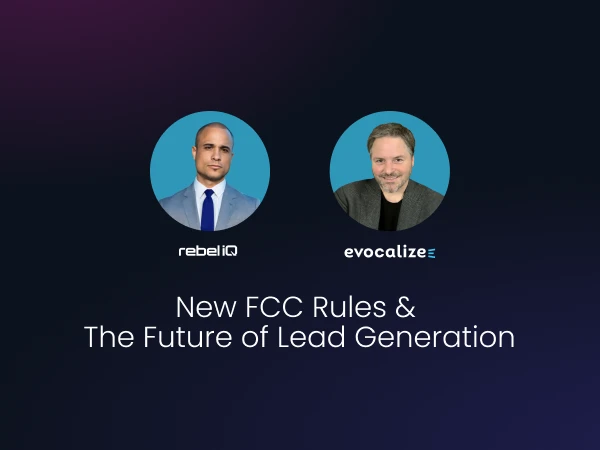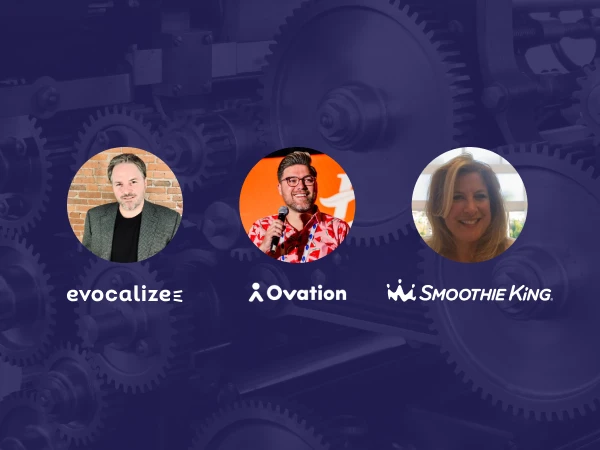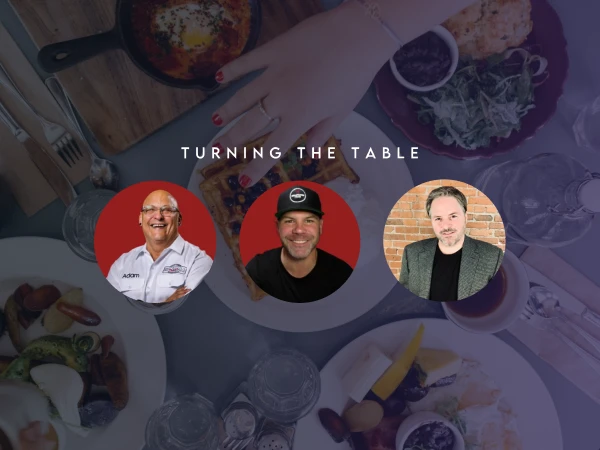Why real estate advertising sucks and how to fix it – Real Estate Insiders Unfiltered
Matthew Marx, CEO of Evocalize, joined hosts James Dwiggins and Keith Robinson on the Real Estate Insiders Unfiltered podcast for an in-depth discussion on why real estate advertising sucks and how to fix it. They cover the declining value of print, the massive size of digital audiences on platforms like Google and TikTok, how to leverage technology to efficiently create quality content, the importance of privacy regulations, and more.
Marx provides concrete statistics revealing where eyeballs are in digital, with companies like Google and Meta reaching billions of monthly active users, and how the average person spends over an hour across Google’s properties daily. The conversation explores the pitfalls of common real estate advertising approaches and how hyper-targeted, multi-channel digital strategies are imperative for success today.
Tune in for advice for agents and brokers struggling to embrace digital, emphasizing starting small and not expecting overnight success. Utilization of technology is mandatory to efficiently manage digital presence across numerous platforms.
Key takeaways
Here are the key takeaways from this podcast episode:
- The declining significance of print advertising
- Massive monthly user counts across leading digital platforms
- Why real estate advertising sucks and strategies to fix it
- The value of tailored, omni-channel digital campaigns
- Tips for real estate agents new to digital advertising

Transcript
James Dwiggins: On this episode of Real Estate Insiders Unfiltered, we talk about digital marketing versus print. We talk about privacy laws, artificial intelligence, and the future of digital marketing. Talked about how to plan your business long term with a digital marketing plan to beat Zillow. It’s going to be an incredible show. Tune in.
You talk about it privately. We talk about it publicly. This is the Real Estate Insiders Unfiltered podcast. Welcome again to the Real Estate Insiders Unfiltered podcast. I’m your host, James Wiggins, along with my co-host Keith Robinson. AKA crazy uncle Keith. Tell us about Matt Marx, the CEO and Co-founder of Evocalize and what we are talking about.
Keith Robinson: Man, we covered a lot of stuff. We dug in on advertising. We dug in on why real estate marketing sucks. We talked about digital media and the future of it. Candidly, one of the best answers I’ve heard to the question of what would you implement today into your business? And, oh, by the way, our first ever podcast earthquake mid-recording. So don’t miss it.
James Dwiggins: So big that it shook the, the the headphones off of, off of Matt. It was awesome. In Texas and the earthquake was in California.
Keith Robinson: It was a big one. So yeah, I get it. Check it out kids.
James Dwiggins: Put in your ears, Matt, welcome to the show. We are excited to have you here while Keith coughs into his microphone.
Keith Robinson: I was muted.
James Dwiggins: You were. That’s true. You were muted. So quick, quick hands, by the way. Yeah. Matt Matt and I’ve known each other for a while. You, I classify you. I’m going to actually call you the digital Yoda today. The digital advertising Yoda is what we’re going to do today.
Keith Robinson: Cause of my cup. Did you literally do that?
James Dwiggins: I didn’t see it. Oh, I didn’t even notice that. That’s so funny. Hey. You the best, Matt. You the best. I love it. I love it. Yeah. You are in for a show, my friends. So let’s start out with typical. Yeah. Just give us a little bit of your background so the listeners and viewers know who you are and what you do.
Keith Robinson: But make sure you end it at Digital Yoda. ’cause that’s pretty reare.
Matthew Marx: Hey, at least, at least it’s not because I look like Yoda guys that.
James Dwiggins: That’d be a little more like Obi Wan Kenobi a little bit.
Matthew Marx: It’s kind of what I expected, where I expected you to go, James.
James Dwiggins: Now that you say that, I might take it that way.
Matthew Marx: I don’t know, man. I’ll take it. I’ve been called worse. Guys, thanks for having me on. I really love, love the pod. Listen to it all the time. So it’s a great, great work.
James Dwiggins: Yes, our first listener.
Matthew Marx: Yes. Filling up the pod.
Keith Robinson: If you could get your mom to subscribe too, that’d be great.
Matthew Marx: So, yeah, just a little bit about me. You know, I’ve kind of done a lot of different things in my career. Unlike some of your, some of the folks who have come on, on your show and sold real estate at the age of 18. I did not sell real estate at the age of 18. I landed in this, this industry after spending a lot of time in, in others.
But just a quick story about me. I actually went to school for genetics. So my undergrad was in genetics at Texas A&M. And I just happened to get swept up in the in the dot com era. So I learned to code and, and that made a lot more money than sitting in the lab, you know, doing genetics research.
And so I, I put myself on through the back half of college writing software and came out of school, writing software and did that for a few years out of undergrad. And then so I’m a techie kind of through and through by background, but you know, that gets boring. And I kind of realized by looking at other people’s code that I wasn’t the best coder.
Keith Robinson: You were probably the best geneticist coder.
Matthew Marx: I got it. Yeah. Yeah. I like that. Like that was early days of gene therapy. My friend, they were very bad.
Keith Robinson: CRISPR. Let’s talk about CRISPR. No, let’s not.
Matthew Marx: So, I went into product and I’ve been in startups and I’ve been in in the investment business, I’ve been in the strategy consulting world.
But the last company I participated in was, was an investment of mine. I was a limited partner in it. The company was called BazaarVoice based down, down here where I am today in Austin, Texas. And we, we grew that company pretty rapidly, a marketing technology company and took it public for a couple of billion dollars back in back in 2012.
James Dwiggins: Damn, you’re buying dinner next time that we have, we hang out.
Keith Robinson: Did you just drop that? Like, oh yeah, we, you know, we had a successful exit. We sold it for a couple billy. Nice.
Matthew Marx: It was, it was a fun ride, but you know everyone started, you know, I was having fun building and inventing and everyone started driving their Lamborghinis into the office you know, and it kind of just started to started to coast a little bit. And so,
Keith Robinson: Hold on, I don’t want to know your one extravagant purchase when you sell a company for a couple of billion dollars and you’re an LP, I don’t, I don’t want, you know, we don’t want to create, we don’t want the IRS to hear this and come knocking, right? So you got your check, it was whatever size it was, what was your one extravagance that you went out and spent a little little coin on that. No, or just be honest.
Matthew Marx: It’s funny I just listened to I just list the one of your pods on Picasso and so this is kind of like connects in. Yeah so I bought condo in Miami and used it about five times so that was a historically stupid purchase, but no, I didn’t, I didn’t buy the Lambo and I didn’t roll it in the Lambo and to the office and so, yeah.
James Dwiggins: Tell us, tell us where you’re at now with you Evocalize, get a little background on what you, what you guys are doing over there.
Matthew Marx: Yeah. So, so what Evocalize does, it’s a digital marketing platform. It’s intended to effectively let data drive decision-making. So we take all this. Like complicated digital marketing is really complicated, right? And so most people don’t do good digital marketing because it’s hard, right?
And so, and it takes a lot of data it takes a lot of time, it takes a lot of education. And so what we built is technology to let to let big guys like, like like the franchisor, portals, tech companies wire our technology in, feed it with data, and then hand it to agents, teams, offices, franchisees, and let them run self-service marketing programs without having to know what the hell they’re doing.
And so. It’s a little humbling as a, as an entrepreneur founding a company. But we can’t, we’re white labeled across a lot of the residential real estate space today. Real estate is where we started. But we have just to give you a size of scale of our company and residential real estate today.
We’ve got a million agents, team and teams and brokers using our platform that have access to our platform and about between 100 and 150,000 monthly active users who use our technology to run marketing programs that actually work in the space. So we’re not only, we can talk more about this, but real estate is only part of what we, what we do.
But real estate is where we started. And so we have a pretty large presence there.
James Dwiggins: And you guys are in a lot of other sectors now as well, correct? Cause you’re not just in residential real estate. You work, I think it’s the restaurant industry and a whole bunch of different things.
Matthew Marx: That’s right. I mean, the problem that we’re solving is not unique to real estate, right? It’s like real estate has listing data and CRM databases and sphere data and website audiences, like all this stuff. But what do we want to do? Right. We want it for a, for a local business. We want to drive our business, right?
We want to bring new customers in. We want to, and that’s not unique to real estate. Real estate is like the quintessential local industry, but restaurants have the same thing, right? There are local McDonald’s, right? Local TGI Fridays that local Smoothie Kings, the client of ours, like that, that need to drive business.
And if you talk with these and, you know, in mortgage and insurance and fitness. And so we have franchise groups in all these industries that use our tools. But if you talk with what drove us to this solution, right? You go walk into your local restaurant. I walked into a local restaurant six months ago.
And it was empty, right? Middle of like dining times, completely empty. And I’ve never seen this restaurant before. And it’s like four blocks from our Austin house. And I walked in and the franchise owners in that restaurant. And I said, and he was working the counter, right? And he owns three locations.
I learned, but I talked to him and I said, well, okay. Your place is kind of empty, man. And I live around the corner and I’ve never heard of it. Did you just open? And he said, no, we’ve been here for two years. And I said, well, like, why does no one know about this place? And he said, I don’t know, man, I’m doing everything I can, but we’re really losing our shirts here.
I’m barely paying the bills. And I said, what are you doing to market? He said, I’m printing flyers. I’m printing. I went into the local high school and I added to their bulletin board. And I’m like, man, what 15 year old is going to look at the bulletin board? Mine isn’t. Mine’s on TikTok, right? So anyway, so I digress a little bit that all these businesses share that same pattern, right?
Things have gone digital and you kind of have to do that in a pretty sophisticated way for it to work.
James Dwiggins: So, so two questions then. Number one is, is print dead? Like, is it done? Like, I mean, we had a place where this just needs to, it just needs to move on. Or is there still a place for print? I mean, we’ll talk about some of this stuff, but like, that’s my first question.
Then secondly, why does so much real estate marketing or advertising just suck?
Matthew Marx: Cause people have no idea what they’re doing. No.
Keith Robinson: Which one are you going to take first? Yeah, take one of those. Is print dead or why does real estate marketing suck?
Matthew Marx: They almost like fit together, James. So, look guys, I don’t know that print was ever alive. Look, a billboard, what are we talking about when we’re talking about print? We’re talking about postcards, mailers. We’re talking about billboards. We’re talking about handouts, right? We’re talking about newspaper ads. When is the last time you picked up a physical newspaper? I can tell you I’m 47 years old and I don’t pick up a physical newspaper.
That’s for damn sure. Right? So I, I think one of the things that, that print misses is first of all, to me, it’s not exciting. I throw all of the print mail I get home away immediately. So I literally have a trash can, I don’t know if you guys, next to the mailbox and I dump it all in and just like sort out the two or three things that I actually should care about.
And I actually had to run. Our second house up in Seattle, the mailbox filled up when we were not there. Of course, again, second houses, you’re not there that much, right? So it filled up and I went and yelled at the, the mail carrier went in the post office. I’m like, man, you’re filling up our mail with all this junk and then you don’t deliver the real stuff, right?
Cause it fills up and you put a notice and he closed us down or whatever. So, I mean, I don’t think I think we’ve gone well past that.
James Dwiggins: Generational potentially at all? Like, I mean, is it still somewhat generational or you just think that we’re past it?
Matthew Marx: I think we’re past it. I’m 40 and I’m, I’m late forties and, and it doesn’t work for me. You know, it, it, the problem is it doesn’t have targeting associated with it, right?
Keith Robinson: So let me push back just for auspices of an interesting podcast, because if we all agree, it’s not very interesting. Right. So. Well, I will agree completely that print is nowhere near as powerful as it was even, I’d say 20 years ago or 15 years ago.
So, but to say it’s dead and has no place, like if I had a targeted geographical farm and I did all of the slick shit that you’re about to talk to us about, about digital marketing and all the other cool things you could do. But as an element of a marketing plan, doesn’t it still have some value?
Especially if you’re adding to mindshare and it’s a group that you’ve already targeted and it is because you can target right, you could pull a list of homes that are non-owners or you could send things to your sphere of influence or some of the more classic, traditional, boring, aged, not as effective, but is it really dead?
Matthew Marx: Well, I mean, if you have unlimited budgets, you should do everything all the time. I mean, you know. Yeah. You know? Sure. You know? Yeah. So, so the thing I’d tell you, Keith, is it just, this is like a, what do you want to invest in, right? And so the whole, our whole lives are about like taking risks, making betts, like determining what to invest in, what to invest our time in and our money in, and real estate for an agent, for a team, for brokerage, it’s no different, right?
You’re like, what are you investing in. And the digital platforms have all the eyeballs, have all the time spent now, and so, sure, like, that’s a fine complimentary, small, tiny piece to your puzzle if you’ve unlimited budget. Postcard mailing is actually pretty expensive. Like when you, when you bake it all down, if you have a nice postcard, you’re spending a buck, two bucks, you know.
Keith Robinson: Probably a buck. You could probably get a jumbo size postcard. That looks pretty good for a dollar.
James Dwiggins: The same though. Yeah, no, I’m not saying it’s cheap. Yeah. You’re basically saying if you spend $500 on postcards versus $500 in digital, you think you’ll get a better outcome.
Matthew Marx: I mean, I think it’s hard to argue the opposite.
James Dwiggins: Well, but I mean, so what are the numbers? How big is the online space?
Give us some stats so that people, like, really understand. Because I haven’t actually looked at this stuff in a while. Like, what, how big is TikTok and Meta and all of these different things?
Matthew Marx: Yeah, well, first and foremost, Google’s the largest, right? So people, people often forget, people think about Google as just the search.
Google search enterprise. I go to the, you know, Google search box and I type in what I want to see. And that’s a big, big portion of the audience. But Google has lots of properties, right? They have something called the Google Display Network. That’s effectively is advertising on lots of the largest websites across the world.
They have, they have YouTube. You know, YouTube is a part of the Google enterprise and lots of other places. Gmail is another really good one. And so when you knit all those things together, Google has 4.3. I just pulled this this morning, 4. 3 billion monthly active users in the world, 4.3 billion.
So so they’re the largest, right? Meta is second, they just crossed over the 3 billion threshold in terms of monthly active users. And Meta is just for everyone listening. If you’re not familiar with the new terminology, Meta is WhatsApp, Instagram, and Facebook, primarily they have some other properties as well, but there are 3 billion.
And then TikTok is the fastest growing channel. They crossed over 1 billion monthly active users, 150 million in the US alone, which is their largest market. So and by the way, so we can talk not only about the number of users they have access to or monthly active users, right? We can talk about the time spent, right?
Which is another really interesting piece to this puzzle because they don’t just have your information. You’re not just going there once. You’re spending a lot of time there as a consumer.
James Dwiggins: Yeah. What is it? Just curious. What is like, what is some of the average times and things that are people are online.
I mean, I can only imagine, especially with the generations that are below me, that makes myself sound old, but like, I mean, it’s got to be massive. That amount of time people spend on their phone. I know I get that stupid display button thing on my phone that says you spend so much screen time. And I’m like, no, I’m going to delete you.
Matthew Marx: So what’s your, what’s your guess? The average, the average US consumer, either you guys like?
James Dwiggins: Daily, weekly, what are we looking at?
Matthew Marx: Daily. Daily, minutes per day,
Keith Robinson: Minutes per day, I’d go at least an hour on all social media platforms or one specific one.
Matthew Marx: What was your answer?
James Dwiggins: Was it on all James? I was all. And I said an hour.
Matthew Marx: Keith – Over, under, over?
Keith Robinson: Over.
Matthew Marx: Definitely over.
Keith Robinson: Yeah. Like I’ve got an 11 year old. She’s probably good for three hours a day. Like she’s bringing up the family average for sure. And if you count YouTube, I mean, kids. You know, if you count YouTube kids, like all of the different channels that they have, like there’s, it’s, it’s gotta be, it’s, it’s over an hour.
Matthew Marx: Yeah. Yeah. So Google’s an hour alone, just so you know, like Google’s channels.
James Dwiggins: Jesus. So basically everyone’s there. This is where the eyeballs are and you know, we, I think we all understand that. So let’s dive into some other stuff. Why does, let’s go back to my original question. Why is real estate advertising sucks so much?
What is it that we’re doing wrong that we’re. What? Everybody’s listening and not. Everybody’s listening is judging my question, but they’re all nodding going. Yeah, we really do. Our advertising really does.
Keith Robinson: It just makes me laugh. It’s funny because it’s true.
James Dwiggins: What are we doing wrong? Is it that we’re just missing the idea of what we’re supposed to be promoting and like who the target audience is?
It mean, is it about self promotion too much? Is it should be about the consumer? What’s your take on this? I mean, you literally do advertising. This is what you guys do.
Matthew Marx: Yeah. Well, the first thing is to get back to your billboard point. Like people treat. Digital advertising, like a digital billboard, right? So, so that’s like not what we should be doing for one and two.
Keith Robinson: Should I have my face on my yard sign? No, nevermind. Just kidding. Just ignore that.
Matthew Marx: You know, in the real estate industry, put your face on everything, Keith. So I think you should dip your head a little, you know.
James Dwiggins: Side joke, side joke.
Keith Robinson: Yeah, we’ll probably put that on the blooper. We’ll explain that someday. Not today.
Matthew Marx: Yeah. No, but so so we either we either don’t it’s this stuff to do. This well gets really complicated I get to find the right audiences. You have to figure out the right targeting You have to figure out how much to spend for that audience. There’s just there’s a lot to to doing that doing this well, right?
And so so i’m not blaming anyone, right? But what we do in the real estate industry is typically replace the billboard or the postcard in media right in digital media, which is which is okay, but not really where you should go or you go straight to leads, right? And you just go like, I’m going to get this.
I’m going to lead low funnel as much leads as I can get. And you know, a lot of those leads are not great leads. If you’re not doing the right kind of audience stuff objective, etc.
James Dwiggins: You’re getting just looky loose versus actual specific people that might be looking at it, that your property that want that actual home potentially?
Matthew Marx: That’s right. That’s right. So the right mix y’all is. You’re everywhere, right? So you can’t skip the billion users on TikTok, right? You can’t skip the, you know, 4 billion users on Google, right? So you need to be digitally present everywhere. And you need to you need to have targeted journeys.
Like you need to be contextually and contextually relevant all the time with the right information, you need to give information to people not just your, not just your, your face out there, right?
James Dwiggins: So the right content at the right time in front of the right person being very specific.
Matthew Marx: That’s right. And then you can ask for the lead, right? And then you can ask for the lead and then you can nurture that lead.
Right? And then what you’re doing is what the portal’s doing. Right? You’re then doing, executing digital marketing for yourself and on a local level like the portals do centrally, and, and you’re, you’re going to start winning.
James Dwiggins: Do you think that, do you think that artificial intelligence is going to play an important role in this?
And where I’m going with that, I’m going to slightly joke here, but like the concept of, I still love that movie. Minority Report. Oh, come on. But like, if you think about it, it’s, it’s very specific advertising to a specific individual. Let’s take the joke out of it. Like, are we going to a place though, where we’re going to have enough data?
And information to be able to have real time specific ad generation for that specific user on behalf of the seller. I think I said that correctly. So like, is that where we’re moving from a technology perspective?
Matthew Marx: We’ve already been there. I mean, we have the technology to do that today. But, but what holds you back from that in the, in the kind of paid channels are the privacy laws that have been put in place.
And so. You can still do that here and there in the advertising world, but most of the major channels like a Google and a, and a meta you’re limited to addressing groups, small groups, but groups of people with messages. Right? So you’re really not gonna be one-to-one generating content minority report style anytime soon.
In fact, the world I, I would say, is moving toward more of a privacy opt-in model than a, than an all-in minority report one-to-one style marketing. But the, the, the technology’s there to do it all, do it all today. There’s, there’s no technology guest. Interesting.
Keith Robinson: So let’s say I own a, a small independent in Anywhere, USA. And I’m listening to this and I think, yeah, okay, I hear you. You’re, you’re probably right. Print’s probably dead. Everything that you’ve said makes almost no sense to me, right? Like I don’t go on TikTok. Does that mean I got to start doing these stupid TikTok dances as part of my, my real estate career?
Like how do I transition from a 52 year old independent who’s got 10 agents in their company to really understanding how I can approach this.
Matthew Marx: Well, the first thing I say to people is like, yeah, you should like get on TikTok, you know, have your, have your teenager or your, your grandkids like teach you how, you know when I first started using and I’m in this business, right.
And when I start. First started thinking about TikTok for our platform four or five years ago. I I, I asked my daughter who was, you know, 12 at the time. Can you like teach me how this thing works? You know, I was legitimately like, she like said, okay, dad, you know, and she’s like showing me her phone, right?
And so that’s how I learned. So just go start like watching the types of content that, that work there. And, you know, I don’t think we all have to do dances, you know, but, but we should be authentic in these channels when we start participating in them.
And, you know, just, we have, we have agents who are, you know, 70s in their, their 70s and still work and still selling real estate who are just recording themselves organically on their phone and creating TikTok videos in ads with them. So that’s the start, right? It’s like, these are organic channels. They don’t have to be super polished and there are tools that can help you do it for you so that you’re not having to learn the whole thing, you know, from the ground up.
And because the problem you get into Keith is kind of what you’re alluding to, right? If you’re doing this for TikTok and then you’re doing it for Instagram. You’re doing it for Reels. You’re doing it for old blue Facebook. Then you’re doing it for all these Google channels and Gmail and YouTube.
It’s like overwhelming from a time perspective. So you really have to find, you know, to be digitally present, you have to find some automation.
Keith Robinson: Well, cause like Gary Vee says, you should put out 80 pieces of content a week or whatever. Right. And yeah, I mean, look, I’m not. The guy’s been very successful, but he’s got a whole team that’s backing and supporting him, right?
He spends a million dollars a year probably in videographers and editors and sound guys and whatever else so, how does how like what do we do? Like let’s say I believe you what do we do?
Matthew Marx: I’m biased, right? I say like, use, use technology to do it for you, right? Because it’s impossible to do it yourself. And if you try to do it yourself, you’re going to spend more time, more money, you know, more effort.
Then if your competitor who just presses a freaking button, their brokerage is already wired up all the content, right? They’ve already wired in all your listings. They’ve set up the best practices, right? And they’re just, it’s either fully automated or they’re pressing a button. And 30 seconds later, they got it going across platforms.
So they have to, you have to use tech.
James Dwiggins: They have to do it that way. By the way, I just wanted all the listeners and viewers to understand that you all just experienced an earthquake. So Keith and I moving there, by the way, was the alerts on our phone saying duck and cover because the movement of us was actually an earthquake.
By the way, I like to call them free back massages. So…
Keith Robinson: Proof that we’re pros though. I was like am I getting dizzy?
James Dwiggins: No. Yeah, I know. I was like, wow, I’m feeling really interesting right now. And then I was like, oh, this vibration is kind of interesting too.
Keith Robinson: Wait, I have a, I have a psychology question. And I know you’re a geneticist and a marketing guru, Yoda. And so
Matthew Marx: This industry definitely calls me a geneticist, Keith. Undergrad genetics. It’s, you know, it’s, it’s world changing.
Keith Robinson: I think agents and brokers struggle a little bit. With social media in some ways, because of in real estate, when you ask for the order and the person says no, they literally reject you, right?
You as a person, as a human being. It’s not like if I buy Adidas instead of Nike’s, Phil Knight cares, but he doesn’t care a lot, right? But when I don’t choose you to represent me, I’ve literally told, you know, to your face or over text or email. And so some of that rejection avoidance is amplified. Some of that willingness to put yourself out there is a little scarier because you, they’re so, and this is for brokerage too.
It’s so personal, right? It’s, it’s deep in heartfelt. How do you get past that? Whether you don’t like your voice. I don’t like my face. I don’t know what to do. I want to be authentic. But if I’m really authentic, what if I ostracize somebody? How do you coach someone who believes us right in listening to this? But it’s like, how do I get past that piece?
Matthew Marx: Just do it. Get over it. Just get over it, right? You know, it’s there’s no, there’s no way you can do it without doing it. Start small, start short. Watch some of the TikTok content, the stuff that goes to millions and tens of millions and gets millions of views.
Don’t worry about that to start, right? You’re not trying to go viral and be this like, you know, influencer overnight in TikTok. What you’re trying to do is just start to start to get into the channel, understand it. Understand what the content is like a little bit. And that’s, it doesn’t take much effort, right?
It’s literally creating a TikTok account, following some folks in the area, following some real estate folks, seeing what people are doing. And then record yourself. And you do not want to be perfect in TikTok. Like that is the point.
James Dwiggins: Yes, man. First blooper on the pod.
Keith Robinson: I think was that, was that an Austin earthquake? What happened?
James Dwiggins: Austin just had an earthquake. Yeah. That’s great. Yeah. You’re not, you got to get you back there, bud. Are you there? We got your audio back. I think it went to another thing. We had, we had another. There you go. You had your Austin earthquake for the first time.
Matthew Marx: Austin is not for earthquakes. Yeah. Austin is not for earthquakes.
James Dwiggins: So I have a question kind of, it takes us back just a little bit, but I think it’s a really interesting. I, so I’ve, I’ve been watching a lot of different speakers on stages at different conferences talking about artificial intelligence and everybody’s got their opinions.
Like if you’re not part of it, you’re going to get, you know, you’re just going to, you’re not going to be here and you’ve got to be, you know, doing this stuff and implementing these things. You made this comment earlier that I think is interesting. Do you think that there’s a movement away from, do you actually think there’s a movement away from all of this data collection?
Like that we’re going to, that this whole concept of AI and all of this automation becomes harder because Americans in general are like, I’m sick of all of this creepy shit in my, in my life. And I’ll give you, I want to give you an example to set this up. I talked to this company that accesses Microsoft Voice Language Database, whatever it’s called, and they can tell by your voice how old you are, your height, your weight, approximately where you were born, what, like, it was creepy shit.
Like, and I’m going, I want to try it, I want to try it, I know, Keith, I figured you’d say that, but like, there’s so many things that you can do with this data, like that comment I made about getting very specific if you wanted to with advertising down to a specific user, but if a lot of these privacy laws change, is it going to hold that kind of innovation back?
Matthew Marx: Yeah. I mean, from a, from a targeting perspective for sure. Right. And so, but you know, there’s, there’s this constant yin and yang in battle back and forth that goes on, you know…
Keith Robinson: But isn’t a part of it, Matt? Cause it’s not that good yet. What I mean by that is like, I’ll go look at something on Amazon, right?
And oftentimes, like I’m not a shopper, I’m a buyer, so I’ll go look on Amazon and I’ll buy it. Well, I keep getting retargeted with the thing I’ve already bought, which is incredibly annoying and frustrating, right? And so it, it needs to get to the, I think people would prefer if it got good enough, I don’t mind you sending me things if you send me the right things and stop sending me the wrong things and but in order to do that, it would have to have more data. But I think you might see people opt in if it gets better.
Matthew Marx: And that’s the thought for advertisers. Like there’s been a saying in in digital marketing for a long time, right? Like the perfect ad is actually information. It’s not, it’s not advertising, right? And so right. You know, that’s actually one of our guiding principles.
And we think about implementing programs. Like if you bring the right home to a home buyer or the right agent who’s just sold a similar home around the corner to a potential seller who knows the market better than anyone else, because they just, they just guided a similar home and a similar seller through the process right next door.
That is information, right? That is valuable information. And so I think we evolved to a world that. I think it’s actually already happening. I think the pinnacle moment was, was a couple of years ago where we were society said, look, we got to crack down on, on, you know, Facebook was a center point to that and you, we’ve got to build all these opt outs in.
And, and, and actually the word has limited what you can do with data. Considerably since then you know, Apple has really cracked down on the use of their mobile device identifier through IDFA, which is some, some process they put in place a couple of years ago. And so that, that that’s already happened, I think, and, and to your point, Kieith, I think you’re dead.
I hate to agree with you, but I think you’re dead. I think, I think you’re dead right. Yeah, I think you’re dead right. It’s like when you get the right message in front of the right person to James’s point at the right time, it’s information and it’s valuable. And so you want it. And actually that, that, that works for me online.
I’m a backpacker. So I love like getting up into the mountains and when, like, I spent way too much money on backpacking gear to save like an ounce. You know, and when a new cottage backpacking gear comes to me in Instagram or Facebook or Google, I’m like, heck yes. You know, I want that.
James Dwiggins: I think that’s an interesting comment in that you, you want to be able to control stuff, but also you want to be able to have information distributed to you that you want.
It’s kind of like, you know, it’s that. That fight that we’re going to go through, by the way, you’re just mentioning some stuff. I just learned about this as I’m making myself probably sound old and dated. What the hell is a MAID number? Like I just literally found out there’s, there’s some numbers. So there’s, I didn’t even actually realize that there’s, I guess it’s an app. How does it work? A MAID number. So it’s…
Matthew Marx: It’s a mobile advertising ID, just to like define it for folks. So it’s a, it’s a number that’s that every phone, every Android, and iOS device has on it, and it’s an identifier for your device that Google treats a little differently than Apple does, but allows advertisers to advertise to you the device.
Keith Robinson: It’s like a fingerprint for your phone.
Matthew Marx: It’s a fingerprint for your phone. Yeah. And it can be changed and, and, but, but no one does that. So it’s, it’s you know, it’s, it’s a pretty good identifier. Now I just mentioned, that’s actually James to. I just mentioned something associated with the MAID number, and that’s IDFA, which is Apple’s adaptation of that, right?
And so, Apple has an identifier, and they have significantly cracked down on the amount of data that can be triangulated or attached to the to the mobile device over the past couple of years.
James Dwiggins: What is some of the data? What, what is incorporated into the MAID or this IDFA number? I just, I’m totally, my curiosity’s piqued.
What, what kind of data is being transmitted out there through this information? Well,
Matthew Marx: Well, so you may have heard and the listeners may have heard about cookie information on a browser, right? Yeah. And a cookie is just a little piece of text to text blob that sits on your browser, sits underneath your browser, and it just tracks a number.
And that number is then communicated to the website that you’re using. Right. And so. And IDFA andGoogle’s I think it’s Google advertising ID. They’re, they work in a similar way. So all it is, is a number that’s provided up to Apple and through Google and can be tracked on the websites you browse and the things you do online.
And so all of your activities can then be associated with that ID and you can then be served digital advertising in the ecosystem based on those numbers.
James Dwiggins: So that’s the kind of information that they’re wanting to figure out how to allow people to have to do things, but also not give out too much information. So there’s some level of privacy.
Keith Robinson: And to let humans have choice on if it’s shared, right? Prior, I guess you probably had some choice, but you didn’t know you did and you didn’t know how, right? And so they wanted to make it easier to opt out. Is that accurate Matt?
Matthew Marx: That’s right And now you have California privacy laws. You have GDPR in…
Keith Robinson: What’s GDPR? The privacy rights of Europe.
Matthew Marx: What’s GDPR? What’s the acronym? European privacy regulations, yeah. And so data protection laws effectively and so what those laws do and now you pretty much have to comply in advertising everywhere, because if you’re doing anything with any scale, you’re hitting California and you’re probably hitting Europe.
And so what you have to do there is you have to ask, there’s consent required for linking some of this data together, PI data or personal information together with that. With these identifiers. And so you have to be it’s a that was never true, right? So that’s a new thing over the past, you know, a few years that the digital advertising has had to adapt to.
But I will tell you that digital marketing system has done a pretty good job keeping targeting levels high while adapting to those.
Keith Robinson: So as a digital marketer how do you feel about that? Like it makes your job a little harder, right? Probably I would assume but maybe a little better because people are people who want to be marketed to are saying yes.
And people who don’t aren’t. So where do you, like, how did, how do you feel at night when you’re sipping on a bourbon and thinking about those recent changes or the changes in the last couple of years?
Matthew Marx: I like, I like consumer choice, right? So to me, you know, they bury it a little bit, but you can go in.
Anyone can go into Facebook or Instagram or any of the online platforms. All of them are required now to have opt outs, data control. You can block certain groups of things. You can block specific conversations that may not be great for you or that you want specific advertisers, you can block everyone from seeing your data, right?
And so once I have that control as a consumer, like if you think about it from a first principles approach, like the consumer should have that control of what happens to their data. And so regardless of being running a digital marketing technology company or not, I think that’s, that’s a cornerstone of what we personally feel like we should do as a society.
And we’ve done that. We’ve taken a lot of steps in that way. Now, I think there’s some holes. You know, the telecom companies, there’s some, some holes in those laws that people don’t think about, you know.
Keith Robinson: Like the calls we all get about our home or our automotive warranty.
Matthew Marx: Yeah. There’s some data leakage besides those things. Right. But I’ll put it that way. So…
James Dwiggins: So two final questions because we got to, we got to wrap here in just a few minutes. I’ll, I’ll take the first, Keith will wrap with this question he always likes to ask, but I want to pivot just slightly. So obviously everyone in residential real estate is talking about lawsuits and we’re not going to go into that right now, but I do want to actually somewhat ask this question related to it.
How does a buyer’s agent prove their value in this post? lawsuit world through this digital advertising mechanism. So, like, what do you think they should be doing there?
Matthew Marx: Yeah, well, I mean, you know far more about the lawsuit conditions and
James Dwiggins: We won’t need to go into that. Just want to talk about the advertising side.
Matthew Marx: But, from a pure advertising perspective, you know, I tend to think in listening to smart folks like you talk about the subject I tend to think that buyer’s agents I’ve bought and sold many, many houses and there have been lots of times where I’ve been super thankful. I’ve had a buyer’s agent by my side guiding you through the process, right?
And you’ve done podcasts that have addressed this and have talked about this, this concept. And so I don’t think buyer’s agents go away in the industry. I think they change and they have to justify what they’re doing in their activities, right? And so how do you and so now you have to go out and maybe do a little bit of different type of marketing and expose yourself out there and talk about how you’re helping, you know, what you’re educating the market, right?
So as a buyer’s agent, you’re gut – I think if you’re paying attention out there and you’re a buyer’s agent, you need to think about how you’re going to get in front of buyers so that you’re bringing them into the funnel. They’re already doing a lot of their own research. We know that you might have them do a little more of their own driving around.
But you need to educate them on the value that you provide. Because fire stations do a hell of a lot of work, you know, as we in the industry all know, and but, they’re not always, the value is not always front and center and so, so to me, it’s, it’s fundamentally, of course I’m biased here, but it’s fundamentally a marketing problem and it’s an education problem.
How do we get the word out? So you should be pumping out content across channels, educating folks on the value of your services and the differentiation of them versus others.
James Dwiggins: You know, one of the things you could do, and just making me think about it a little bit is, you know, I always find consumers are trying to do a lot of their own education and, and research on the buy side, but they’re sorting through lots of data.
I’ve seen some really great agents do things like videos on neighborhoods, explaining the types of houses are here and you know, who is the builder and what’s the quality of the home and what’s the appreciation rates been in this neighborhood and just content like that. NER did a really good piece, the 179 Things a Buyer’s Agent Does.
To me, there’s an entire marketing campaign right there. Like you could take. Those points and create an entire digital marketing campaign around services. We’re you’re right in that we advertise the hell out of all the stuff we do on the list side and we suck at articulating things that we do on the buy side, but it’s not complicated.
Just start looking at all the things that you do. Look at what buyers, the questions buyers are asking and then turn those into content pieces because it’s going to resonate with the buyer going, “Oh yeah, I’m having that exact problem. I should talk to this agent about that.” You know, I think it’s a great comment, by the way, great product for Evocalize to do as an entire buy side content strategy.
So all right, Keith, wrap us up. I know that this is kind of…
Keith Robinson: This is what we always end up. So if you were an agent, or an owner of a real estate operation. What’s the one thing you would implement today to help or change your business?
Matthew Marx: So I think the one thing that this is all everybody, does everyone answer this in a self serving way?
Keith Robinson: No, but it’s ok if you do.
James Dwiggins: You can, but just make sure it’s like useful.
Matthew Marx: Yeah, here’s the mentality. I would say there’s a mentality that that the industry needs more of, right? And that’s a – and it’s hard in times like this that are that are tight in the industry. But long term thinking, right? So if you think about, we’ve talked a lot about data, talked a lot about marketing, but I made, I made mentioned early in this episode about how the portals do it, right?
And so the portals are great at long term thinking, right? So they’re long term thinking, they’re, they’re marketing out in these channels that we’re talking to you about, right? They’re trying to get folks attention. So they come to their site so they can get them to look at homes so they can build a relationship with them so that they’re ready when they’re ready to convert into a lead.
And then they have nurturing that goes out automatically to keep people involved and in the ecosystem. Right? So They’re not going out and trying to get leads that can work tomorrow. They’re trying to get in, be the first eyeball in front of consumers. And so to me, that’s what the industry, if the industry wants to spend less money on, you know, the, on the Zillow’s, you know, Zillow of the world, buying leads late stage, and they wanted control their own destiny and do it more efficiently.
If me as a technologist, if I’m sitting in the chair of the everyday agent, I think six months a year out and I say, I’m going to start, I’m going to plant the seeds to work and build my database over time. So my database gets larger. So I have more data and that will make me money as I nurture them. But it’s the patience – we were in COVID, you know, when COVID hit in March, we saw advertising fall off a cliff, marketing drops precipitously in the, in the first couple of months.
And we had a lot of data showing a lot of consumer demand that demand was not stopping. So we started publishing a report out there to the industry and telling them, think long-term. We did a retrospective and looked a couple of months ago at the agents who kept pumping dollars through marketing during that time.
And they made 400% more money than the people who paid back, pulled back during that three to four month period where the world was uncertain. So that’s my lesson. Think long-term, keep investing. Maybe if you need to back it off a little bit to get through it, do that. But stay in market. Stay digitally present.
James Dwiggins: Matt, that was awesome. Super appreciative of having you on, on the show. You are officially our digital advertising, I guess, Obi-One Kenobi would be better, I guess, at this point. So Jenny, Willie, thanks for being here. And we’ll look forward to having you back in the future.
Matthew Marx: So thanks guys. Appreciate it. You got it. Thanks.
James Dwiggins: It’s our job to say out loud what everybody’s only thinking to themselves. It’s your job to subscribe to this podcast so you never miss an episode.
Trusted by 1,500,000+ franchisees and local operators
Empower your franchisees.
Drive real local results.
Not every franchisee on your team is a marketing pro — yet.
Let’s change that. Reach out, and we’ll show you how!




























